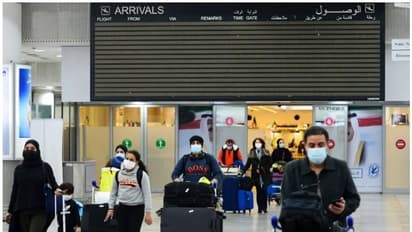No quarantine, testing for international travellers arriving in India from today

Synopsis
Only 2% of passengers chosen at random will now be required to provide samples for testing. According to the new criteria, they will be able to depart the airport without waiting for the reports.
According to amended rules announced by the Union Health Ministry, international travellers from at-risk countries will no longer be required to quarantine for seven days or be tested at the airport. With the Omicron variant-driven wave decreasing in the country, the ministry has also eliminated the day eight repeat test.
Regardless of whether they exhibited Covid-19 symptoms, all overseas travellers were expected to be quarantined for seven days, tested on the eighth, and report to the government's Air Suvidha site. Instead, patients must now monitor their health for 14 days and report any COVID-19-like symptoms to a nearby health centre or the government helpline 1075.
All overseas travellers will still be required to upload a self-declaration form with a history of travel in the previous 14 days to the government's Air Suvidha portal before departure and submit a negative RT-PCR test completed 72 hours before departure. According to the new travel standards, only asymptomatic people will be allowed to board the plane.
Those travelling from at-risk nations – a dynamic list of countries based on their COVID-19 situation – were required to submit a negative COVID-19 report from 72 hours previous to departure and to be tested upon arrival and wait for the results before departing the airport.
Only 2% of passengers chosen at random will now be required to provide samples for testing. According to the new criteria, they will be able to depart the airport without waiting for the reports.
The new standards also allow India to grant quarantine-free travel to persons who have been completely vaccinated and have certifications from other countries. Currently, this list covers 82 countries, including Australia, Bangladesh, Canada, Hong Kong, Malaysia, Nepal, and Singapore, that agree with India on mutual acceptance of immunisation certificates for vaccines that are either domestically recognised or WHO recognised.
Also Read | COVID guidelines revised, govt removes 7-day mandatory quarantine rule
Also Read | Glenmark Pharma with SaNOtize announces nasal spray for COVID treatment
Also Read | Next COVID variant will be more contagious than Omicron, perhaps deadlier, warns WHO
Stay updated with the Breaking News Today and Latest News from across India and around the world. Get real-time updates, in-depth analysis, and comprehensive coverage of India News, World News, Indian Defence News, Kerala News, and Karnataka News. From politics to current affairs, follow every major story as it unfolds. Get real-time updates from IMD on major cities weather forecasts, including Rain alerts, Cyclone warnings, and temperature trends. Download the Asianet News Official App from the Android Play Store and iPhone App Store for accurate and timely news updates anytime, anywhere.